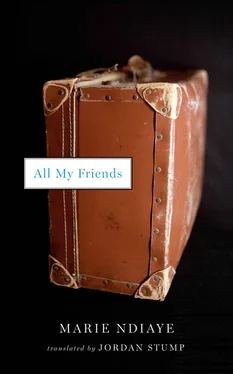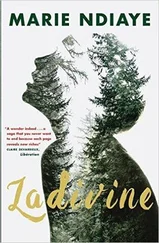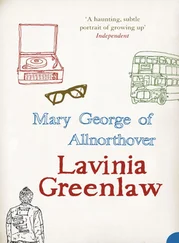Had Jimmy not just raised that very question of money?
He’d started walking again, sharply tugging Brulard along, his pace brisker now, and Brulard thought he’d asked her an uncomfortable question about money. Brulard was feeling more carefree. She realized that, for her part (and it wasn’t yet time to start suffering for Jimmy, and when that time did come her own good fortune would smother any overly burdensome remorse in Brulard, so she hoped), she had no real reason not to go on waiting and hoping. A delay, an unforeseen complication, something she didn’t yet know of, something she would soon learn: that was probably the whole cause of her despair, because she didn’t know. And, in a way, that ignorance wasn’t real.
“Well?” Jimmy was asking in a troubled voice.
“Am I really here with you now?” Brulard asked in surprise.
“How are you managing financially?”
“Oh, I’ve got some money these last few days.”
“From him? You sure?”
“Yes,” Brulard firmly answered.
“Then. .” (All at once Jimmy’s voice was so slow, so quiet, that Brulard could scarcely hear it.) “If that’s true, then I suppose. . you might be able to help me out. It wouldn’t have to be much, but. . ”
Brulard’s thigh began to vibrate. With labored nonchalance, she took out her telephone. Uniformly tall, good-looking, and athletic, happy passers-by jostled her, not seeing her, with her diminutive build and, that morning, her gray face, and all around them, from what Brulard could make out here and there, the sole subject of conversation was the quality of the snow and the food.
The mountain had come closer. Now it was perfectly clear.
Brulard let out a small laugh, thinking: my mother never protected me from anything at all.
She held the telephone a few centimeters from her ear, saying nothing. Jimmy anxiously looked on, but she couldn’t bring herself to give him a smile or still her trembling chin for his sake. Turning off her phone, she silenced the voice that was, beyond all doubt, speaking specifically to her, uttering her full name with such fury but also such hateful grief that her legs were still weak and burning hot.
Jimmy asked her no questions. Brulard concluded that he would ask her nothing more about these phone calls. He knows what all this is about, or can guess, from something he knows and I don’t, something he knows I don’t know, she thought, calmly perceptive, her mind suddenly clear, almost cold, impassive, capable of accepting the worst and not seeking it out but encouraging it, if it had to be, to reveal itself. What he knows and is afraid I might learn: that might even be why he came here, she went on to think. But is it because he wants me to know, or because he wants to make sure I don’t?
“Jimmy, why did you come here?” said Brulard, very quietly, so as not to frighten him.
“To take you home with me. So you wouldn’t be alone,” said Jimmy, looking straight ahead, his jaw hardened.
A progressive reddening revealed a network of dilated capillaries on Jimmy’s thin, hollow cheeks.
“What makes you think I’m alone?”
“I think you are. You’re out walking with me and my dog, aren’t you?”
And Brulard realized he was putting on this breezy display to conceal his discomfort and apprehension. Suddenly she saw him, despite his new clothes (new, but made of cheap leather, she observed), as a pitiful and ridiculous person, although often managing to hide it with a certain grace. Jimmy cut a sad figure, not that it was really his fault. Quickly and instinctively, she caressed his cheek. For had Jimmy ever once attained even a modicum of success in anything he’d done? Jimmy had made a life for himself, in a mediocre, half-baked way, always overestimating his abilities, and whenever luck smiled on him a little he wasted no time losing the money in cunning, vaguely demeaning ventures, such as, Brulard recalled, a certain kiosk built and manned by Jimmy in a suburban mall, where he offered to make his customers a pin bearing their likeness while they waited, with the aid of an implausible machine bought at an exorbitant price through a want ad, or else a pizzeria, sadly situated at the intersection of two highways, which Jimmy had taken over, aiming to make it a regular haunt for people in Brulard’s circle, and which to this day he hadn’t managed to sell, so strongly did the walls and the site exude failure, unhappiness, stupidity.
Now Jimmy was here, stubborn and tireless, hard-headedly confident in his ability to put up a good front, even if, as Brulard could see in the luminous air, the brilliant light of the lake, he’d so flagrantly and definitively aged — which is to say that no trick, no subtle arrangement of the hair on his forehead, or his high-buttoned shirts, could now prevent anyone noticing, before anything else, his hunched back, his bowed legs’ irreversible thinness, the coarsened grain of his skin, the shadowy veil over his eyes, which, for a few seconds, when Jimmy thought himself out of sight, turned lost, evasive, and devious.
Exhausted, Brulard abruptly veered toward a bench on the edge of a vast lawn that sloped gently off to the lake. She sat down, despite the presence of Eve Brulard on the other end, the newly hostile and oppressive presence of a young Eve grown remarkably thin and bony. How this Eve Brulard looks like Lulu, Brulard said to herself, with a pang of displeasure and guilt. She pretended not to notice. She closed her eyes, fretfully wondering why the young Eve should now be appearing to her in the form of an enemy. When she half-opened her eyes, she noted that the splendid, high-spirited young people strolling past the bench were the very ones who’d jostled her in the streets of the old town.
“That’s odd,” she said cautiously.
Then Jimmy bent over and whispered in her ear:
“You see who’s sitting over there?”
“Yes?”
“It’s Lulu,” said Jimmy with a stunned little scowl. “Can that be?”
Brulard buried her face in her hands, shivering in fear and bewilderment. She thought she could hear Jimmy whispering, then nothing more, and when she peeked up again Jimmy had replaced the emaciated girl beside her. At her feet, the dog was looking up at her with what she could only interpret as avid affection. And those eternal young people from before strode by over and over, their long legs grazing Brulard’s and Jimmy’s knees. Did Jimmy realize that these abnormally healthy, good-looking young men and women seemed determined never to leave them again? Brulard wondered.
“What would Lulu be doing here?”she asked in an infuriated voice.
“I left her with the Alphonses. The plan was that the Alphonses would take her skiing,” said Jimmy, casual and patient. “What, may I ask, is the problem with that? What is the problem?”
“Everywhere I hear people saying there’s no more snow. So, you know, it’s strange.”
“There’ll always be more than enough snow for fatsos like the Alphonses and a kid like Lulu who can’t stand snow,” said Jimmy sententiously.
“But why should Lulu be so skinny all of a sudden?” Jimmy kept quiet, in that heavy, mired way of his.
“So supposedly she got skinny, just like that, in the space of a week?” said Brulard. “Because her mama chose to. . ”
She sniffed dubiously.
“I didn’t notice what Lulu was wearing,” she then said. Jimmy’s spirits revived, and he answered:
“She was wearing what I bought her for this Easter holiday with the Alphonses: a silver down coat with matching ski suit and fluorescent green ankle boots. I wanted her to make a good impression. The Alphonse girls have all that and much more.”
“The girl I saw on the bench wasn’t dressed in silver,” said Brulard, calmly triumphant.
Читать дальше












